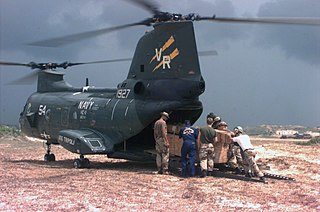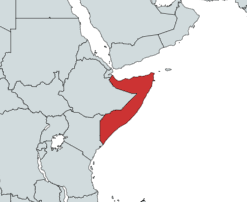
The United Nations Security Council (UNSC) is one of the six principal organs of the United Nations (UN) and is charged with ensuring international peace and security, recommending the admission of new UN members to the General Assembly, and approving any changes to the UN Charter. Its powers as outlined in the United Nations Charter include establishing peacekeeping operations, enacting international sanctions, and authorizing military action. The UNSC is the only UN body with authority to issue resolutions that are binding on member states.

The Authorization for Use of Military Force Against Iraq Resolution of 2002, informally known as the Iraq Resolution, is a joint resolution passed by the United States Congress in October 2002 as Public Law No. 107-243, authorizing the use of the United States Armed Forces against Saddam Hussein's Iraq government in what would be known as Operation Iraqi Freedom.

United Nations Security Council resolution 794, adopted unanimously on 3 December 1992, after reaffirming resolutions 733 (1992), 746 (1992), 751 (1992), 767 (1992) and 775 (1992), the Council "[expressed] grave alarm" regarding the situation in Somalia and authorised the creation of the Unified Task Force (UNITAF) to create a "secure environment for humanitarian relief operations in Somalia" in order to provide "essential for the survival of the civilian population". The current resolution determined that "the magnitude of human tragedy caused by the conflict in Somalia, further exacerbated by the obstacles being created to the distribution of humanitarian assistance [constitutes] a threat to international peace and security".

The Unified Task Force (UNITAF) was a United States-led, United Nations-sanctioned multinational force which operated in Somalia from 5 December 1992 until 4 May 1993. A United States initiative, UNITAF was charged with carrying out United Nations Security Council Resolution 794 to create a protected environment for conducting humanitarian operations in the southern half of the country.
Chapter VII of the United Nations Charter sets out the UN Security Council's powers to maintain peace. It allows the Council to "determine the existence of any threat to the peace, breach of the peace, or act of aggression" and to take military and nonmilitary action to "restore international peace and security".

The Authorization for Use of Military Force is a joint resolution of the United States Congress which became law on September 18, 2001, authorizing the use of the United States Armed Forces against those responsible for the September 11 attacks. The authorization granted the president the authority to use all "necessary and appropriate force" against those whom he determined "planned, authorized, committed or aided" the September 11 attacks, or who harbored said persons or groups. The AUMF was passed by the 107th Congress on September 18, 2001, and signed into law by President George W. Bush on September 18, 2001. Since its passage in 2001, U.S. presidents have interpreted their authority under the AUMF to extend beyond al Qaeda and the Taliban in Afghanistan to apply to numerous other groups as well as other geographic locales, due to the act's omission of any specific area of operations. In December 2016, the Office of the President published a brief interpreting the AUMF as providing congressional authorization for the use of force against al-Qaeda and other militant groups. Today, the full list of actors the U.S. military is fighting or believes itself authorized to fight under the 2001 AUMF is classified.

United Nations Security Council resolution 886, adopted unanimously on 18 November 1993, after reaffirming resolutions 733 (1992) and all of its subsequent resolutions on Somalia, the council discussed the situation in the country and renewed the mandate of the United Nations Operation in Somalia II until 31 May 1994.

United Nations Security Council Resolution 1950, adopted unanimously on November 23, 2010, after recalling previous resolutions on the situation in Somalia, including resolutions 1814 (2008), 1816 (2008), 1838 (2008), 1844 (2008), 1846 (2008), 1851 (2008), 1897 (2009) and 1918 (2010); the Council re-authorised states to intervene in acts of piracy by Somali pirates at sea for a further period of twelve months.

United Nations Security Council Resolution 1724, adopted unanimously on November 29, 2006, after recalling previous resolutions on the situation in Somalia, particularly resolutions 733 (1992), 1519 (2003), 1558 (2004), 1587 (2005), 1630 (2006) and 1676 (2006), the Council re-established a group to monitor the arms embargo against the country for a further six months and condemned an increase in the flow of weapons to the country.

United Nations Security Council Resolution 2002, adopted unanimously on July 29, 2011, after recalling resolutions 733 (1992), 1519 (2003), 1558 (2004), 1587 (2004), 1630 (2005), 1676 (2006), 1724 (2006), 1744 (2007), 1766 (2007), 1772 (2007), 1801 (2008), 1811 (2008), 1844 (2008), 1853 (2008), 1862 (2009), 1907 (2009), 1916 (2010) and 1972 (2011), the Council tightened sanctions against Eritrea and Somalia to include individuals and entities recruiting or using child soldiers in the Somali Civil War, in addition to those responsible for attacks against schools and hospitals in Somalia.

United Nations Security Council Resolution 2020 was unanimously adopted on 22 November 2011.

United Nations Security Council Resolution 1801 was unanimously adopted on 20 February 2008.

United Nations Security Council Resolution 1872 was unanimously adopted on 26 May 2009.
United Nations Security Council Resolution 1897 was unanimously adopted on 30 November 2009.

United Nations Security Council Resolution 1831 was unanimously adopted on 19 August 2008.
United Nations Security Council Resolution 1816 was unanimously adopted on 2 June 2008.
United Nations Security Council Resolution 1846 was unanimously adopted on 2 December 2008.

United Nations Security Council Resolution 2093 was unanimously adopted on 6 March 2013.
As a reaction to the ongoing conflict and deteriorating humanitarian situation in Somalia, the United Nations Security Council imposed an open ended arms embargo on Somalia in January 1992.

United Nations Security Council Resolution 2687 was adopted on 27 June 2023. In the resolution, the Security Council voted to extend authorization for the African Union Transition Mission in Somalia (ATMIS) until 31 December 2023.












